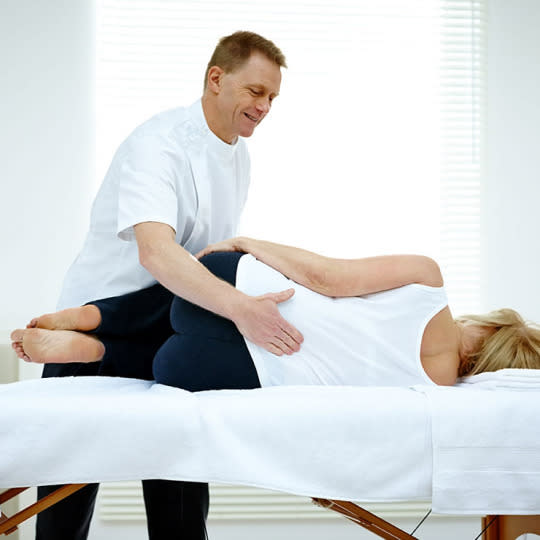7 Things Your Chiropractor Knows About You the Minute You Walk Into the Room

(Photo: Getty Images)
It’s no surprise that your chiropractor might suspect you have back pain just by watching you move. But identify the way you sleep, or what you do for a living? Yes, it’s possible—and no, your chiropractor isn’t psychic. It’s just that your posture can reveal a lot more about your overall health and lifestyle than you might realize…
You’re addicted to your phone.

(Photo: Getty Images)
One of the most common things chiropractors notice in their patients is a rounding of the spine along the neck and down toward the shoulder blades. “There’s a new diagnosis for this—it’s called ‘text neck,’” says Adam Nachmias, DC, a chiropractor in New York City.
Related: 6 Things Chiropractors Can Help With—And What They Can’t
You’re a writer.

(Photo: Getty Images)
Or an accountant. Or a truck driver. Basically, you spend most of your day sitting. “The human body is not constructed for long periods of sitting. It’s designed to move and redistribute weight periodically,” says Robert Hayden, DC, PHD, FICC, a chiropractor in Georgia. When you sit for long periods, your psoas muscles, the ones that connect the torso and leg, get tight, and your hamstrings shorten. And that can show up as a tilted-forward-at-the-hips posture.
You have stomach issues.

(Photo: Getty Images)
That hunched-forward position can also have implications for digestion: When your upper back is curved, it can compress your organs, leading to reflux or GERD. (Hack your gut bacteria for easier-than-ever weight loss.) “Once we work to release the muscles near the diaphragm and under the rib cage, my patients tell me that their reflux is much better,” says Erickson. “Your body is designed to use those big trunk muscles.
You sleep on your stomach.

(Photo: Getty Images)
"While you’re asleep, the full weight of your head pulls on the flaccid muscles and ligaments that hold the cervical spine together,” explains Hayden. “That amount of weight on the delicate structures of the neck will eventually cause joint damage.” This presents itself as a head that tilts downward, as well as pain, numbness, or tingling sensations in the upper extremities.
Related: 7 Reasons You’re Tired All The Time
You’re out of breath.

(Photo: Getty Images)
Yet another side effect of that hunched posture? It can compress your organs, says Erickson, and cause your lungs to take in up to 30% less oxygen. Depending on your overall fitness level, she explains, this might make you feel tired or out of breath on a day-to-day basis.
Your lug your laptop around all day.

(Photo: Getty Images)
When you carry something heavy, you tend to hike up the shoulder that’s supporting the load. The habit can lead to misaligned shoulders, which will be visibly obvious, as well as changes to the curvature of your spine, says Nachmias. “Alternating the side of the bag will help keep one side from carrying all the weight and prevent a drooping shoulder or curving of the spine,” says Hayden.
You’re feeling down.

(Photo: Getty Images)
“When I look at someone walk, if they avoid eye contact and their shoulders are rounded and stooped, it tells me something about their self-image. It tells me how they feel about themselves,” says Hayden. “Your emotions can control your musculoketal structure.” (Instantly boost your self-image with these 5 tips.)
By Amanda Kelly
This article ‘7 Things Your Chiropractor Knows About You The Minute You Walk Into The Room’ originally ran on Prevention.com.
